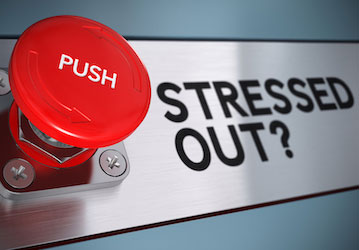Stress is unavoidable, especially when working hard to lose weight. Alleviating or overcoming your stress is one way to cope, but you also can learn to embrace it and make it your ally.
You might believe that stress is out of your control, and the only way to cope is to avoid it. The good news is there are many ways you can respond to stress. Try the following strategies to turn stress from enemy to ally.
Reframe threats to challenges.
Next time you’re in a stressful situation, you can choose how to interpret it. Is it a true threat? Is this something that will bring you down? Or you might view the threat as a challenge and think, “This is an opportunity to learn something.” It’s your chance to prove that you have the resources to deal effectively with this situation. Shifting the lens from threat to challenge—from adversity to opportunity—can open up your perception.
Embrace anxiety.
Nervousness can feel unpleasant, and the emotion and physical embodiment of anxiety often becomes a source of stress. Many have been taught to “relax away the symptoms” when they’re feeling stressed. However, research shows trying to calm down can negatively impact your performance, so reinterpret your anxiety as excitement. Tell yourself that the sensations you feel are helping your mind and body prepare—rather than a sign that you can’t handle what’s going on—to help boost your performance and enable you to feel more confident and composed.
Relax when needed.
Recovery is essential to help you stay robust while you cope with stress. When your stress response is chronically on overdrive, it can drain your energy and make you more susceptible to illness and injury. Use mind-body techniques such as deep breathing, imagery, and progressive muscle relaxation to activate the “rest and digest” system to balance out your fight-or-flight response. And prioritize sleep because it helps you feel armed and at the ready to manage your stress.
Connect to bigger-than-self goals.
It can be a challenge to find meaning in day-to-day hassles like the ones you experience at work and home. When you’re feeling burned out, turn your self-focused goals into “bigger-than-self” ones by connecting to those values and greater life aspirations that matter most. What’s driving you? How will a healthier lifestyle contribute to the world and those around you? What kind of positive impact can you make? Is it honorably serving your nation? If you have children, is it raising them to be compassionate? Focus on something larger than yourself.
 Exercise more.
Exercise more.
The energy you feel when overly stressed can be overwhelming. As you notice the effects of stress on your body, such as your heart rate increasing, you might feel even more stressed. Put that energy to use exercising more. Exercise can help you calm your nerves, distract from your stressful thoughts, and lose weight.
Help others.
When you’re feeling overwhelmed, it might seem counterintuitive to invest time in helping others. In addition to the fight-or-flight response, there’s “tend-and-befriend,” which can encourage you to reach out, protect others, and strengthen social bonds. Caring for others creates hope and courage, and buffers against the harmful effects of severe traumas and life-threatening stress. When you reach out to reduce suffering in others, you create meaning and connection. You build resilience too.
Stress management isn’t “one size fits all,” so it’s important to know what works for you. Take the opportunity to learn new strategies when you can. HPRC offers many resources to help you and your family cope with stress. You can also learn more how your stress mindset can influence its physiological and psychological impact on your well-being. Remember: You don’t have to go it alone. Lean on friends, family, or the Military and Family Life Counseling Program.
For more information, read a more in-depth article about how to make stress work for you.
Learn more at our “Get into Fighting Weight” guide.


